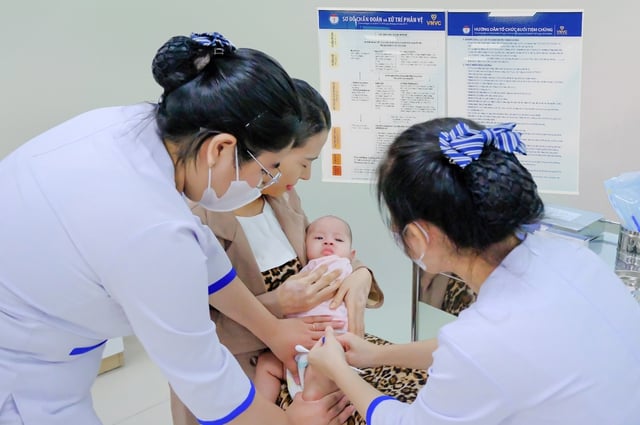What dangerous diseases are children susceptible to?
According to Dr. Doan Thi Khanh Cham, Medical Manager of Region 2 - North, VNVC Vaccination System, the erratic weather in our country makes it difficult for the body to adapt, especially for young children whose immune systems are not yet fully developed, and their protective antibodies from their mothers gradually decrease over time. Research by the World Health Organization (WHO) shows that rain and heat cause air humidity to increase to over 80%. This is a favorable condition for viruses, bacteria, and molds to develop, causing dangerous infectious diseases such as diphtheria, whooping cough, tetanus, polio, hepatitis B, pneumonia and meningitis caused by Hib bacteria.
Children are susceptible to dangerous infectious diseases - PHOTO: VECTEEZY
Diphtheria can cause respiratory obstruction, pneumonia, myocarditis, and a 20% risk of death in children under 2 years old.
Whooping cough causes prolonged coughing, vomiting, and can lead to complications such as broken ribs, respiratory arrest, and a risk of death of up to 90% in children under 1 year old. Since the beginning of the year, our country has recorded a number of deaths of young children due to complications of whooping cough such as severe pneumonia, respiratory failure, and dilated ventricles.
Tetanus has pathogens that exist in the soil and sand environment, easily entering the body through any wound, even the smallest. Tetanus in infants and young children has a mortality rate of up to 95%.
Children often have the habit of sucking their fingers and putting objects in their mouths, making them more susceptible to viruses and bacteria - PHOTO: VECTEEZY
Polio is transmitted through the digestive tract and can cause paralysis of the limbs, difficulty moving or loss of movement, paralysis of the spinal cord, diaphragm and intercostal muscles, leading to respiratory failure and death. With hepatitis B, according to statistics, up to 90% of infected children can develop chronic disease, with a high risk of cirrhosis and liver cancer.
Hib bacteria usually reside in the nose and throat and can cause pneumonia, meningitis, and blood infection, with a 5-10% risk of death. 15-30% of children with Hib meningitis have permanent neurological sequelae.
Vaccination is an effective way to prevent disease in children.
The Ministry of Health has assessed that in 2025, the risk of infectious disease outbreaks is very high. The Ministry of Health recommends that people, especially young children, need to be fully vaccinated on schedule to avoid contracting dangerous infectious diseases.
According to Dr. Cham, to prevent diseases in children, parents should give their children all the vaccines on schedule in the early stages of life, especially the 6-in-1 vaccine to prevent the 6 diseases that cause high sequelae and mortality mentioned above.
Children receive 6-in-1 vaccine at VNVC - PHOTO: MOC MIEN
The 6-in-1 vaccine is prepared using modern technology with acellular pertussis components, which rarely cause side effects such as fever or pain at the injection site. The vaccine is highly effective in preventing the disease, up to 99% if all 4 doses are fully injected and children need to complete the vaccination schedule before 24 months of age:
- Dose 1: When baby is 2 months old (as early as 6 weeks old)
- Dose 2: 1 month after dose 1
- Dose 3: 1 month after dose 2
- Dose 4: in the second year of life, usually between 16-18 months (at least 6 months after dose 3).
In particular, the 6-in-1 vaccine helps prevent all 3 types of Polio virus 1, 2, 3 for children. Meanwhile, for the expanded immunization program, children need to take 3 doses of Polio vaccine (to prevent types 1, 3) and 2 more doses of Polio vaccine to prevent type 2.
Currently, Vietnam has two types of 6-in-1 vaccines, including the ready-to-use type and the type that needs to be reconstituted before injection. Of these, the ready-to-use 6-in-1 type does not need to be reconstituted before injection, helping to shorten the injection time, reduce the risk of errors and avoid infections during the process, while ensuring the correct dosage for each injection.
Parents, don't let your children miss important shots.
According to Dr. Cham, getting enough doses and on schedule helps children build strong immunity right from the first years of life. Studies show that the 6-in-1 vaccine requires 4 injections to help the child's body develop full immunity and be up to 99% effective in preventing disease. If the child only gets 1 or 2 injections, the vaccine's effectiveness will not be optimal. For example, 1 injection is only 40% effective against polio, and 30% effective against whooping cough and diphtheria.
In addition to vaccination, parents should give their children enough nutrients to increase their resistance - PHOTO: VECTEEZY
In addition, parents should also prevent diseases for children by keeping the house clean and airy, limiting children's exposure to sources of disease. Adults and siblings in the family also need to be fully vaccinated to avoid transmitting diseases to children. When children are unfortunately sick, they need to see a doctor early, avoid using drugs on their own, and treating them with folk remedies that can make the disease worse.
Source: https://thanhnien.vn/uu-diem-cua-vac-xin-6-trong-1-cha-me-can-biet-truoc-khi-tiem-cho-con-185250603104523222.htm






































































































Comment (0)